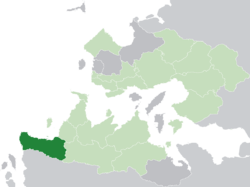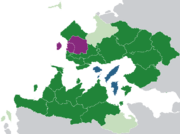Azmir: Difference between revisions
mNo edit summary |
mNo edit summary |
||
| Line 103: | Line 103: | ||
The north Azmir coast was first settled by [[Ethlorek migrations|Ethlorek migrants]] in the 70s and 60s BC, in the same period as the settlement of [[Kur'zhet]] and [[Cadenza]]. Numerous statelets emerged in the area then known as Asimihaira, and by 100 AD a hierarchy had evolved with several dominant lordships. The [[Duchy of Nikhreda]] came to be the leading power in the region, but through the late 8th century a series of regencies and dynastic issues led to its downfall at the hands of the rising [[Margraviate of Azmir]]. | The north Azmir coast was first settled by [[Ethlorek migrations|Ethlorek migrants]] in the 70s and 60s BC, in the same period as the settlement of [[Kur'zhet]] and [[Cadenza]]. Numerous statelets emerged in the area then known as Asimihaira, and by 100 AD a hierarchy had evolved with several dominant lordships. The [[Duchy of Nikhreda]] came to be the leading power in the region, but through the late 8th century a series of regencies and dynastic issues led to its downfall at the hands of the rising [[Margraviate of Azmir]]. | ||
The Marquesses of Azmir resisted Christianisation through the first millennium and into the 1200s, when a Cadenzan missionary presence on the west coast began to develop. Christian settlements at Meqn and Tyarz were tolerated at first, but at the start of the fourteenth century the [[Azmiri Crusade]] broke out, drawing in crusaders from Cadenza and across Astyria. At their conclusion, Azmir emerged victorious and with a much-strengthened national identity that saw it exerting its hegemony over much of the southwest. | The Marquesses of Azmir resisted Christianisation through the first millennium and into the 1200s, when a Cadenzan missionary presence on the west coast began to develop. Christian settlements at [[Meqn]] and [[Tyarz]] were tolerated at first, but at the start of the fourteenth century the [[Azmiri Crusade]] broke out, drawing in crusaders from Cadenza and across Astyria. At their conclusion, Azmir emerged victorious and with a much-strengthened national identity that saw it exerting its hegemony over much of the southwest. | ||
[[File:02puertoDeVeracruzDetalle.png|thumb|left|250px|[[Khem]]'s waterfront in the late 1800s]] | [[File:02puertoDeVeracruzDetalle.png|thumb|left|250px|[[Khem]]'s waterfront in the late 1800s]] | ||
Revision as of 19:47, 28 August 2021
Azmir | |
|---|---|
 Azmir (dark green) in the Kingdom of Trellin (light green) | |
| Nation | Trellin |
| Capital | Khem |
| Area | |
| • Total | 96,075.06 km2 (37,094.79 sq mi) |
| Population (2013) | |
| • Total | 17,317,092 |
| • Density | 180/km2 (470/sq mi) |
| Demonym | Azmiri |
| Time zone | UTC−1 (TCT) |
| Area code(s) | 080, 081, 082 |
Azmir (pronounced /ˈæzmɪər/), officially the Margraviate of Azmir (Trellinese: Metlan Azmirka), is a province of the Trellinese Empire. It is the twelfth largest province in Trellin and Hysera by total area, at approximately 94,000 square kilometres.
The province is the 3rd-most populous in the empire, with 17,317,092 inhabitants. It borders Mevirin to the northeast, the Sea of Jajich to the north and west, Khatax to the east and Aztec National League to the south. It also shares Cadenza's only land border, through the Cadenzan exclave of Laeryt in northwest Azmir. The seat of provincial government is at Khem. Azmir is the most recent province to have joined the empire, having been a protectorate until the marriage of its ruler, Marquise Iressa, to Mahrim of Trellin in 1988.
History
The north Azmir coast was first settled by Ethlorek migrants in the 70s and 60s BC, in the same period as the settlement of Kur'zhet and Cadenza. Numerous statelets emerged in the area then known as Asimihaira, and by 100 AD a hierarchy had evolved with several dominant lordships. The Duchy of Nikhreda came to be the leading power in the region, but through the late 8th century a series of regencies and dynastic issues led to its downfall at the hands of the rising Margraviate of Azmir.
The Marquesses of Azmir resisted Christianisation through the first millennium and into the 1200s, when a Cadenzan missionary presence on the west coast began to develop. Christian settlements at Meqn and Tyarz were tolerated at first, but at the start of the fourteenth century the Azmiri Crusade broke out, drawing in crusaders from Cadenza and across Astyria. At their conclusion, Azmir emerged victorious and with a much-strengthened national identity that saw it exerting its hegemony over much of the southwest.

Geography
Azmir's eastern border, with Khatax and Mevirin, is formed primarily by the river Ruhükyar and Lake Timenava and Lake Uzarnet. The western coastline of the province is lined with low mountains, the Vekra Yarsali, part of the same volcanic chain that formed the islands of Cadenza and Kur'zhet. The most famous of these volcanoes, Kaië Ryio'qi, last erupted in 2014, killing over 860 people.


